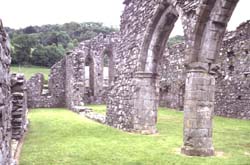 |
 |
 |
 |
 |
 |
 |
|
|
Cistercians Abbeys: CYMER Name: CYMER Location: nr Dolgellau
County: Gwynedd Cymer abbey was founded in either 1198 or early
1199, under the patronage of Maredudd ap Cynan, lord of Meirionydd,
and his brother Gruffyd. It was colonised by a community of monks
from Cwmhir Abbey in Powys.(1) This
monastery was one of the later
Cistercian foundations in Britain. It is situated at the confluence
of the rivers Mawddach and Wnion; it is for this reason that the
monastery was given the full title of Kymer deu dyfyr, which
means ‘the meeting of the waters’. Although the community
was situated on an important thoroughfare (the lowest fording
place
of the estuary) it remained small and unimportant and was nearly
always in a state of poverty.(2) However,
Cymer did possess a very
large and fine silver gilt chalice and paten, which must have been
hidden on the mountainside at the Dissolution. These objects
were rediscovered
in the nineteenth century and are now in the National Museum
of Wales in Cardiff. Today
the site
is in the care of the Welsh Historic Monuments. Remains of the
church and of the cloister layout can
be
viewed
by the public. The adjacent farmhouse was the late medieval abbot’s
house, and retains its fifteenth-century roof.(4) Some
medieval belongings
of Prince Llywelyn the Last (d. 1282) have also been found at the
site of Cymer abbey.
|
